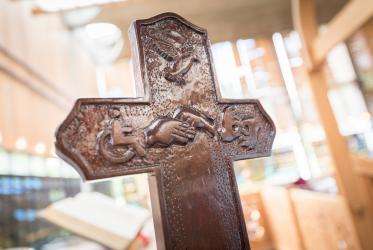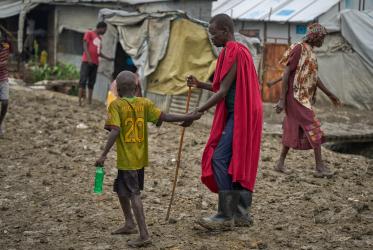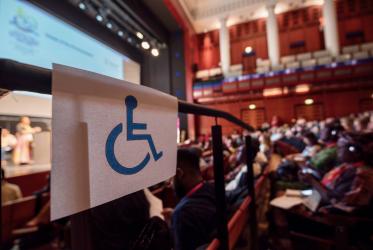At the initiative of the World Council of Churches Ecumenical Disability Advocates Network (EDAN), the Church of Uganda is now including persons with disabilities in its “Empowering youth and women for sustainable livelihoods” project. This project, which is being implemented by the church’s Planning, Development and Rehabilitation (PDR) Department in the Busoga Diocese, aims at impacting and improving household incomes through farming skills and management ethics for sustainability.
Speaking when she visited Rev. Nason Baluku, PDR’s director on 14-15 February, Anjeline Okola, EDAN programme executive, said: “The church accounts for a big percentage of development initiatives in sectors like health, agriculture and education in Africa. In the course of our work, we have realised that persons with disabilities have largely been left out in many of these development initiatives that are aimed at improving people’s lives. This project aims to challenge development planners and implementers to be disability inclusive in their work.”
The charity approach to disability among churches and church institutions has hindered inclusion of persons with disability in development. Persons with disabilities are still largely seen as those who need care but nevertheless, with continued awareness raising and advocacy, EDAN is working with churches to change this perspective.
Among the activities EDAN is undertaking is a three-year project entitled “Inclusion of Person with Disabilities in Development Programmes.” The project started in January 2015 with technical and financial support of the Finnish Evangelical Lutheran Mission (FELM). To implement this project, EDAN is working with select churches, church development organisations and non-governmental organisations in Kenya, Uganda and Tanzania.
EDAN facilitates the project implementers which include the Church of Uganda, Methodist Church of Kenya, Anglican Development Services of Kenya, Evangelical Lutheran Church of Tanzania and SASA Foundation Tanzania to identify, carry out needs assessment, train and to include persons with disabilities in their development programmes. The implementers work very closely with the disabled persons organisations in these countries.
In Busoga diocese, where the Church of Uganda is implementing “Empowering youth and women for sustainable livelihoods”, the project implementer, Esther Eliyowaki, working with the Busoga Union of Disabled Persons, has identified 138 persons with disabilities and equipped them with vocational skills such as radio mechanics, tailoring and welding. They have also been trained on how to farm using “God’s way,” a concept borrowed from the forest and a Biblically-based form of conservation, or climate-smart, agriculture which restores degraded land and increases crop yields as well as reducing labour for smallholder farmers by up to 50%.
“Since I started farming God’s way, hunger is a thing of the past in my household. I have enough food to feed my family and sell to my neighbours. From the proceeds of my farm, I am able to pay school fees for my children and even build a good house for them. For a very long time, my dream was to sleep in a good house. This dream is now becoming a reality,” said Ronald Wagodo, a physically disabled beneficiary in Bugayi Parish.
“I can now take care of my parents from my tailoring business. I was trained and given a machine. I have also made new friends,” said Mary, a deaf person in Bugiri Parish.







